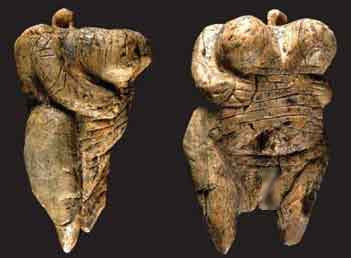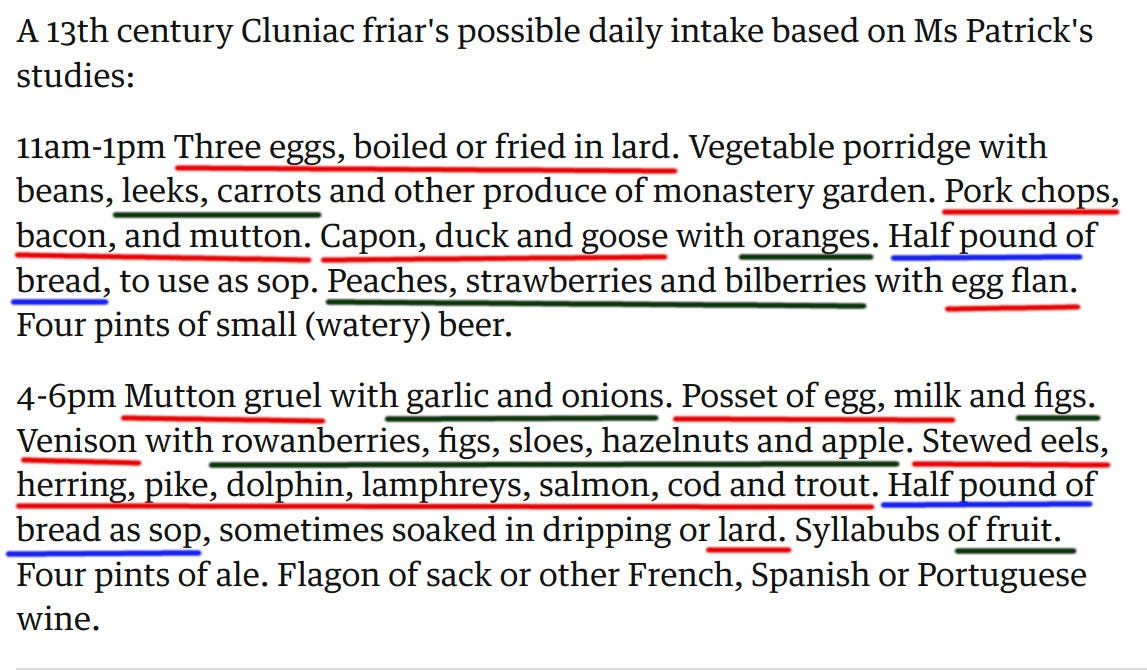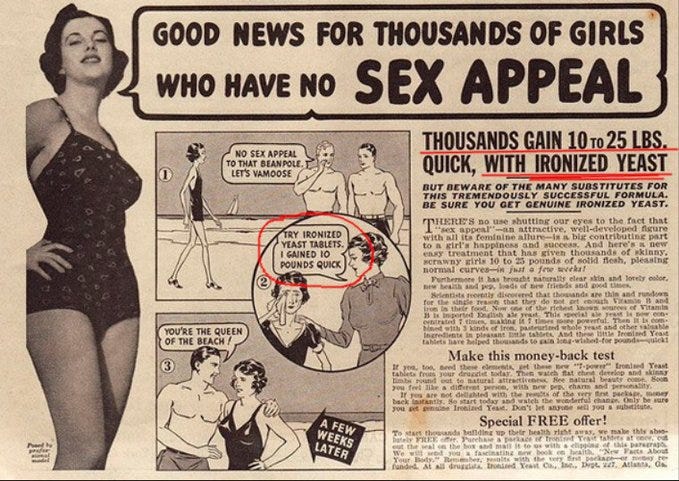Is Obesity a New Phenomenon?
Fat People During Prehistoric, Medieval and Current Times
Overweight people existed even during prehistoric times.
The above 41,000-year-old figurine Venus of Hohle Fels, made from mammoth ivory, is the oldest undisputed depiction of a human being. The woman portrayed by that prehistoric artifact lived in a cave near Schelklingen, Germany. Some experts argue that she was considered a fertility goddess, and the amulet above is the first known pornographic object. If these experts are right, the figurine illustrates the crude tastes of prehistoric men!
She could not purchase potato chips, low-carb nutritional bars, ice cream, cake, butter, or other modern foods. She likely consumed what other tribe members could harvest or hunt in the forests near her cave: nuts, roots, berries, grass-fed meat, and other purely natural paleolithic products. She never received any vaccines and never saw TV advertisements promoting junk food. Despite all that, Venus gained much weight from her prehistoric paleo diet.
Could some of her direct descendants still live in Schelklingen? Are any of them possibly working at the Schelklingen Community School?
Medieval Times
Many records show that the nobility, clergy, and other well-off sedentary people gained weight during medieval times.

Those monks did not shop at Costco. They had no access to potato chips, Twinkies, or any other “ultra processed foods.” Yet, supported by their communities, these monks ate very well while spending plenty of time praying or performing other sedentary activities.
Bone evidence and historical records confirm:
The new evidence backs records from Westminster Abbey, showing that six eggs a day was normal for monks. In the middle ages, monkish obesity was Europe-wide. The Portuguese Cistercians had a test: monks unable to squeeze through a certain doorway at Alcobaca monastery's dining room had to fast while slimmer colleagues tucked into "pastry in vast abundance."
Their diet is described as follows. I underlined animal products in red, fruits and vegetables in green, and grains in blue.
Everything these monks ate was “natural.” There were no ultra-processed foods then, and much of what they ate was wild-grown or wild-caught, full of medieval natural goodness. GMOs, chemical fertilizers, MSG, and other modern inputs were centuries away from those people’s tables.
Of course, most contemporary people could not afford most of the above, so they ate much less, lacked variety, worked harder, and were mostly slim.
“Nobody Likes a Skinny Girl”
During the early 20th century, women had body image problems and anxiety due to being too thin. A cottage industry of weight gain products existed for such women:
Other ads recommended supplements touted to work QUICKER THAN BEER:
(an aside: those weight gain products possibly benefited from iron mentioned in both ads. Excess iron is known to impair glucose tolerance, resulting in a tendency to gain weight. Almost all weight gain ads from that time mention iron. If you do not believe me, view the ads and check for yourself.)
One ad boasts 28 weight gain in JUST ONE MONTH:
The days of weight gain ads are gone: since 1980, we have rapidly put on weight:
40% of People Are Now Obese
Things greatly changed around 1970, when rates of obesity tripled for men and women.
There is no shortage of explanations: various experts blame carbs, sweet drinks, red meat, GMOs, ultra-processed foods, saturated fats, and so on.
Large sums of industry money supporting diet research favoriting their products. All sorts of countries defy diet stereotypes:
Hong Kong has the highest life expectancy and the highest meat consumption per person, suggesting that meat is good.
Of course, this meat-eating trend is new to Hong Kong. Older Hong Kongers never gorged on meat, and we have no idea what the lifespan of young Hong Kongers will eventually be.Japan has one of the highest shares of carbohydrates in the diet and very low rates of obesity, suggesting that carbs are good - but see below
The prevalence of obesity in Germany (19%) is much higher than in Japan (4.5%) (source). Does that make the Japanese healthier? Japan’s rate of diabetes (6.6%) is comparable to Germany's (6.9%) (source)
Russia bans all GMO products and yet has a 30% obesity rate, putting it on par with other obese countries despite “no GMO” laws
As a result, we are getting fatter and developing diabetes at much greater rates than in the past for reasons that are understood very poorly.
This post does not intend to provide any new findings. I hope the historical facts and stories I presented will help us appreciate that fat people existed for thousands of years. It seems that rates of obesity for people having the means to eat any foods they fancy have possibly not even changed much.
I have dieted for the last twenty years, and there was not one day when I allowed myself to eat anything I wanted in the amount I wanted. When I got married in 1999, I weighed 204 lbs. I had several ups and downs after that. Today, I weigh 194 lbs—and would probably be above 300 had I not watched what I eat. The struggles were very real.
I want to ask you, my dear reader, to share your experiences with dieting.
There are two discussion rules
You can state any opinion politely
I will mercilessly remove any nasty or abusive personal comments (something I usually do not do, but this discussion thread will be an exception).
Why are we getting fat now? What worked for you or your loved ones?
Let us know!













I am a 59 year female and Intermittent fasting as a lifestyle has kept me slim. I only eat two meals a day, no fast food, rarely eat out, no processed food. I eat meat from Wild Pastures, butter, eggs, veggies and very little fruit, mostly just berries. I agree toxins create inflammation which creates fat and therefore I don’t drink alcohol ever. I also don’t drink caffeine since MRI’s of the brain shows a cup of coffee reduces blood flow to the brain by as much as 52%.
I was covid vax injured but the intermittent fasting along with ivermectin and other supps cleared out most of the spike protein and the nattokinase broke up the microclotting so I got my breathing back and got off the oxygen tank. I still take a lot of the supplements for good health.
I think that are four reasons for it based on my experience and observation of those around me. In order of importance, first, I would argue that is the lack of movement - sedentary life will result in weight gain (at least it has in my case). Working in cyber security and AI means that I spend too much time in front of computer and unless one attempts to compensate, the weight gain is almost a given. This happened three times during my life so I do not think that it is just a random occurrence. Before I got married and had kids, I used to run and exercise regularly. Since I have had kids, that changed (and it is changing again as they grow older) as I no longer had the time to keep up with the exercise. Second, the time spent to get and prepare the food also changed. Before kids, looking for the ingredients and taking time to cook the food was something that could be managed. Now the kids are first so the quality of what I eat is lower than it used to be. Third reason? Age. I have to do a lot more exercise when compared with 20 years ago to get the same results. Unfortunately, I do not have a solution long term on how to mitigate this one because one's body can take only so much before things start to "fail". Final reason? Sleep or rather lack of. If you do not get good sleep regularly, then I think that again, you gain weight. Rest seems to be essential, at least in my case, to prevent significant weight gain. A couple of other things that I found useful - restricting intake of food to 8 hours per day (say between 11am and 7pm) and actually following the fasting routines indicated in the Christian calendar - I admit I was sceptical but it does seem to work well (at least it did for me for the past 3 years).